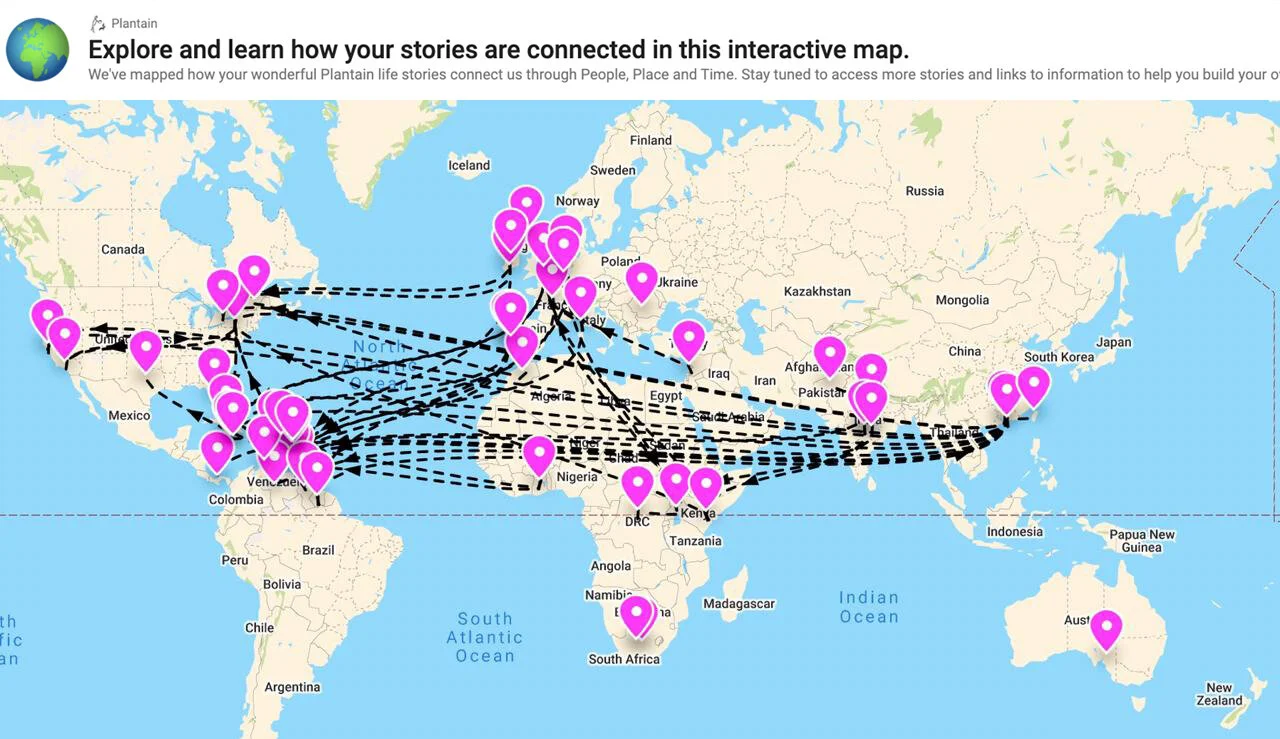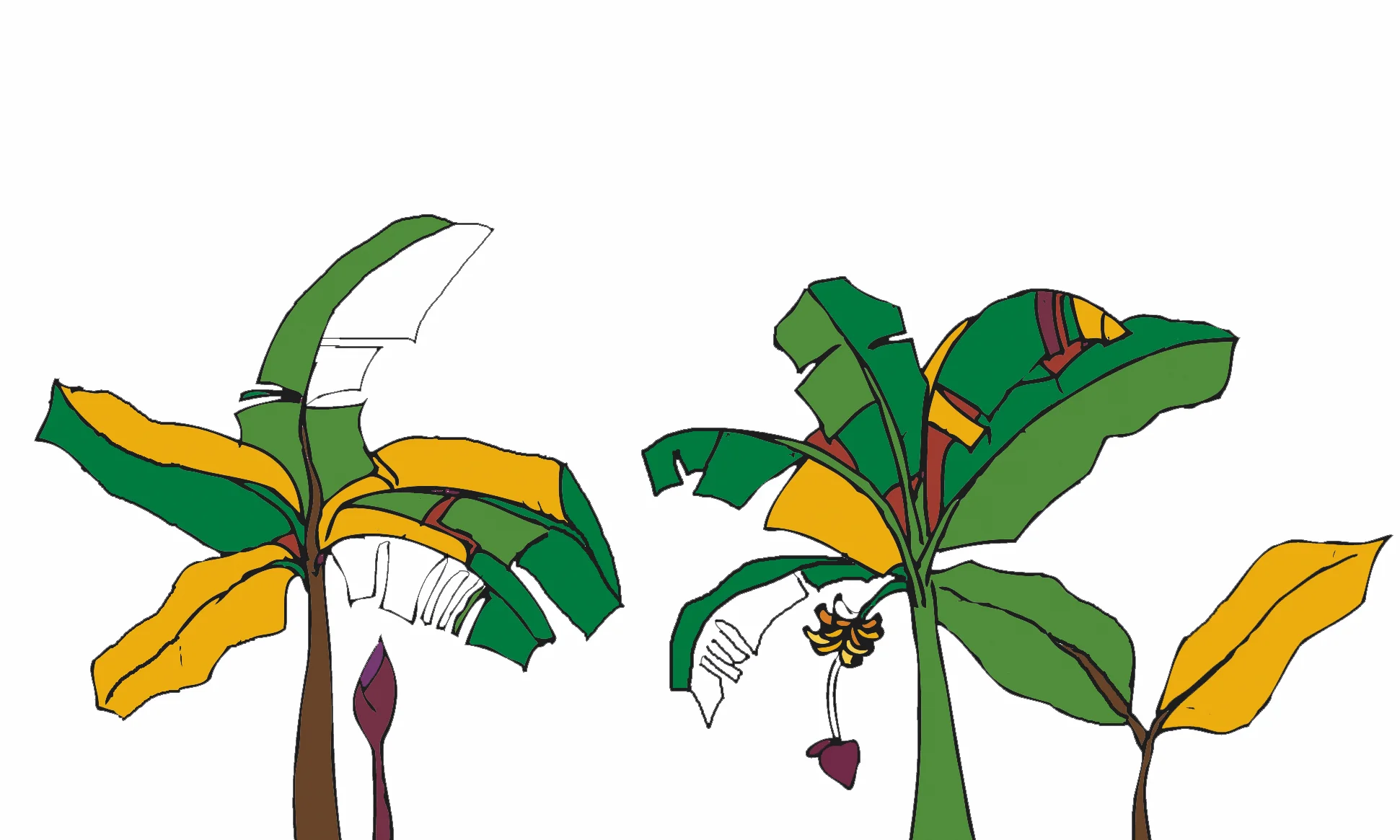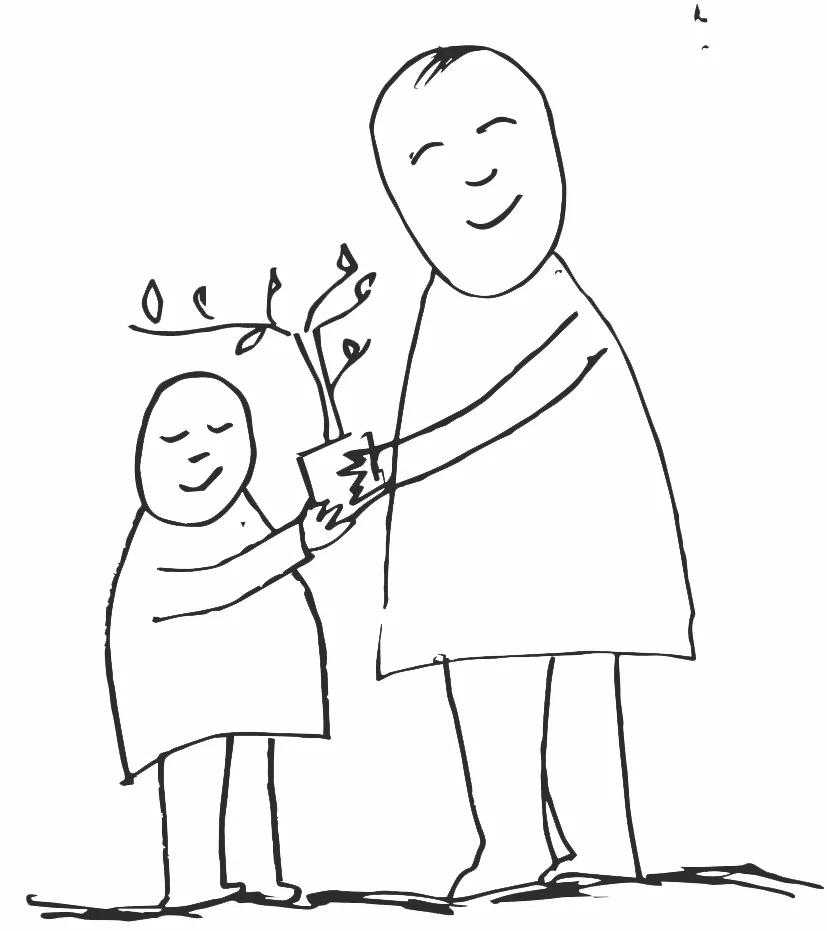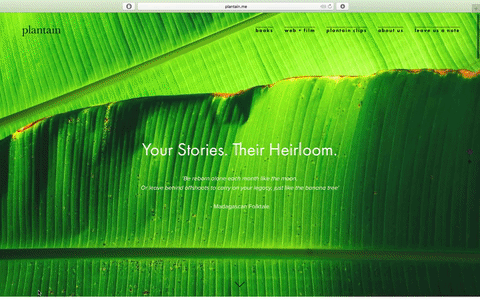The 802 Caribbean Women, Children and Men of the M.V. Windrush
This entry contains the full ship manifests showing the names and details of the 1027 women, children and men who boarded the M.V. Empire Windrush in Trinidad, Kingston, Tampico (Mexico), Havana, and Bermuda, and disembarked at Tilbury Docks, Essex, on the 22 June 1948; historical videos and resources; and details from Life Story projects.
Between 1948 and 1970, nearly half a million people migrated from the Caribbean to Britain.
They were encouraged by the 1948 British Nationality Act that granted citizenship and right of abode in the UK to all members of the British Empire. These Caribbean men, women and children lived, worked and built families, that contributed to rebuilding Britain after World War II. They were later referred to as "the Windrush generation".
Advert for passage on M.V. Empire Windrush from Kingston, Jamaica to the UK. Source: The Daily Gleaner, 15 April 1948
The ship manifests below show the names and details of the 1027 women, children and men who boarded the M.V. Empire Windrush in Trinidad, Kingston, Tampico (Mexico), Havana, and Bermuda, and disembarked at Tilbury Docks, Essex, on the 22 June 1948.
Of these, 802 gave their last residence as a Caribbean country, 66 people gave their last residence as Mexico, 119 were from Britain, and 40 from other parts of the world.
In 2018, many Caribbean born British citizens who came to the UK as part of the Windrush generation were deported in a political scandal. They were wrongly detained, denied legal rights, or threatened with deportation from the UK by the Home Office. This scandal, which is still ongoing today, included people who left the Caribbean as young children and by that time had lived, worked and built families in the UK over 60+ years.
Click through the images to learn more about these brave women, men and children, and do reach out to us if you want to record the stories of your Windrush family, or if we can help you in any way.
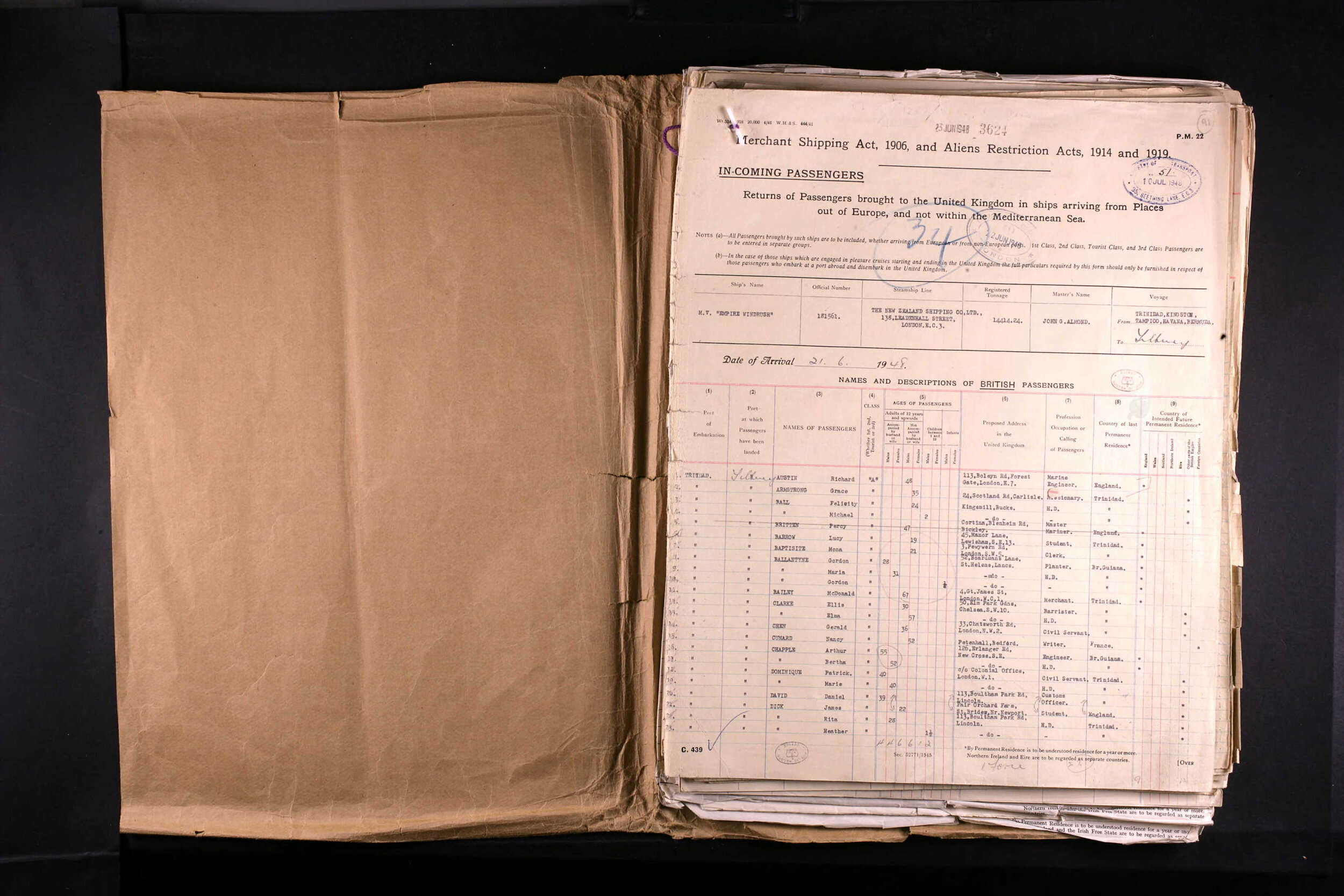
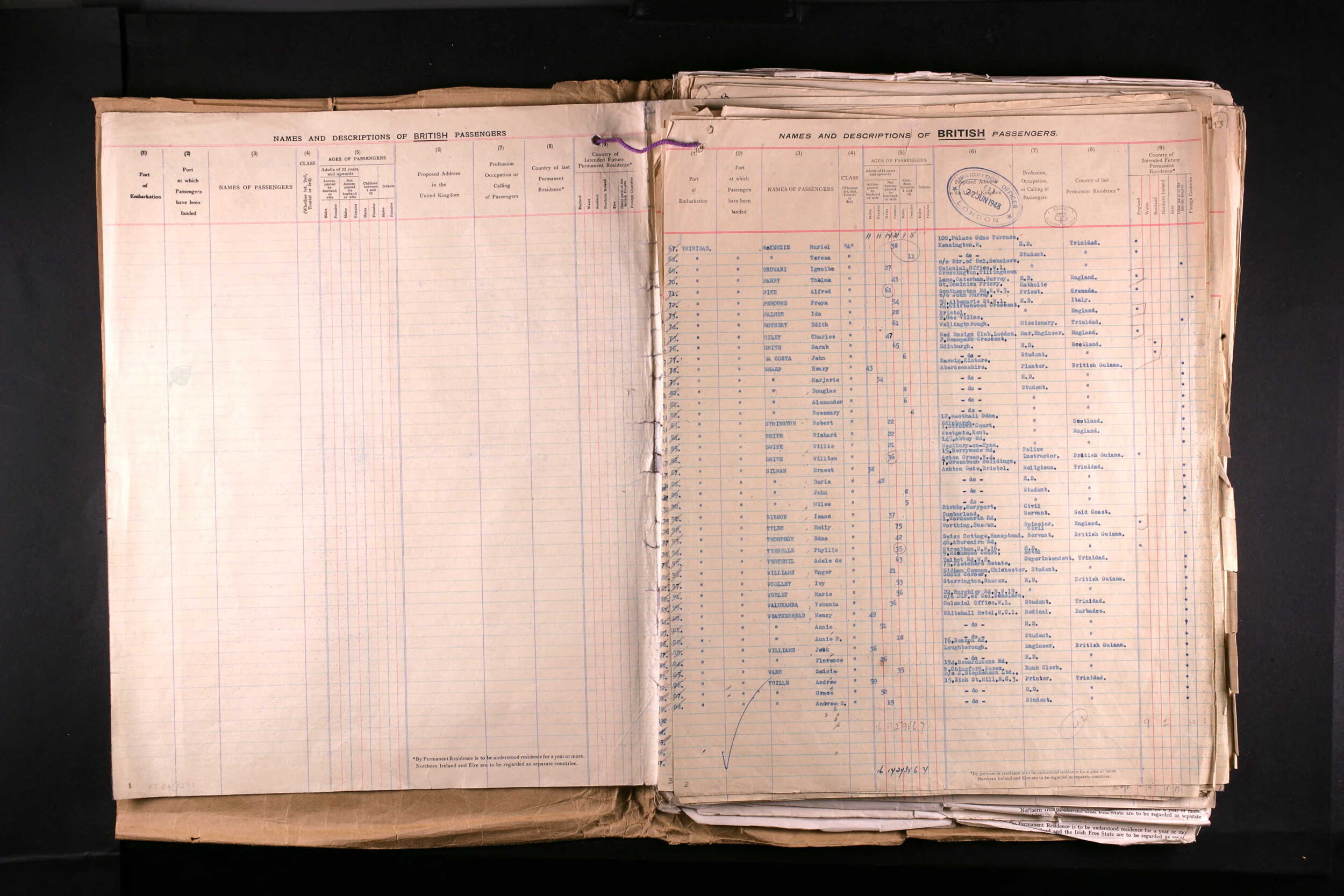
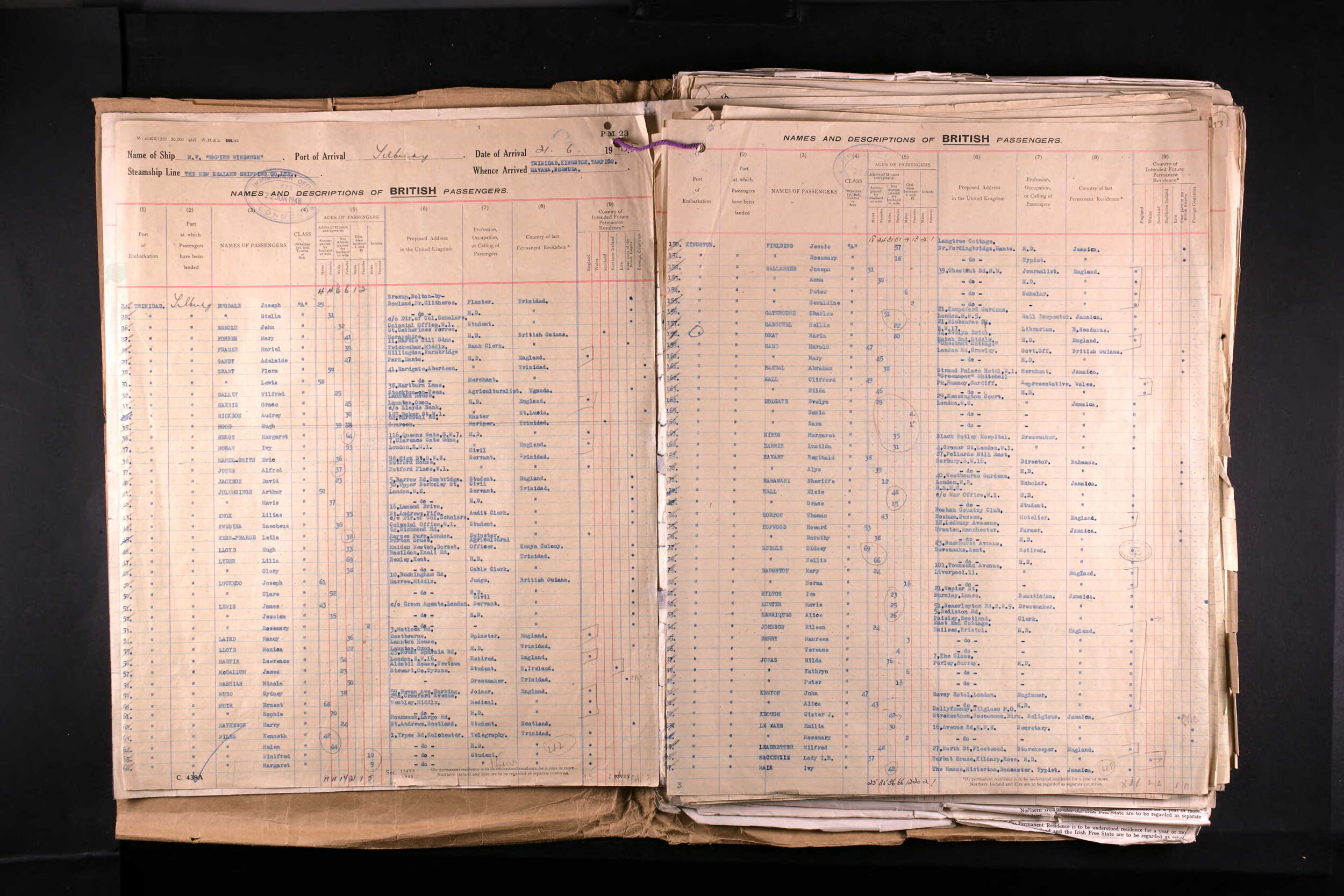
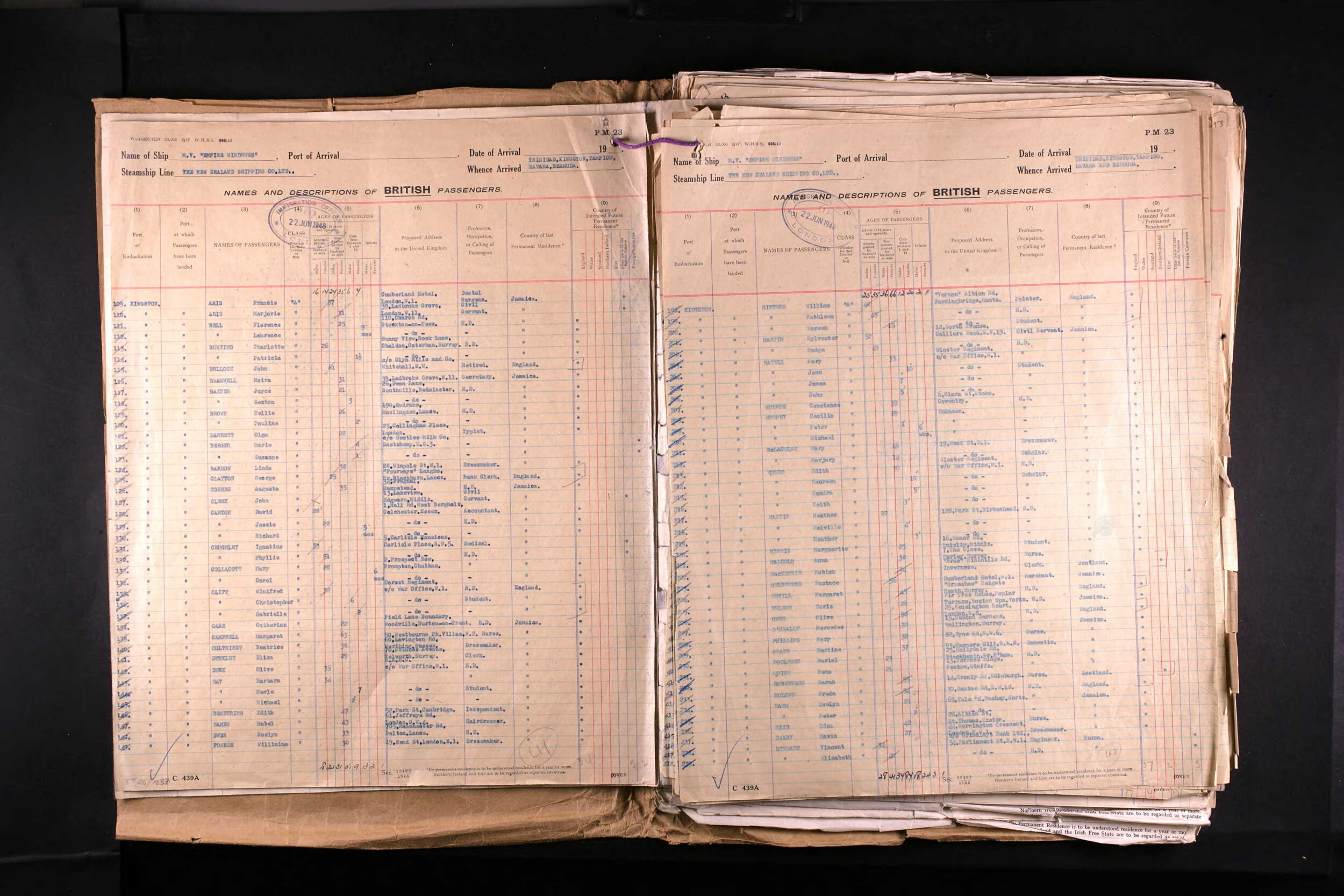
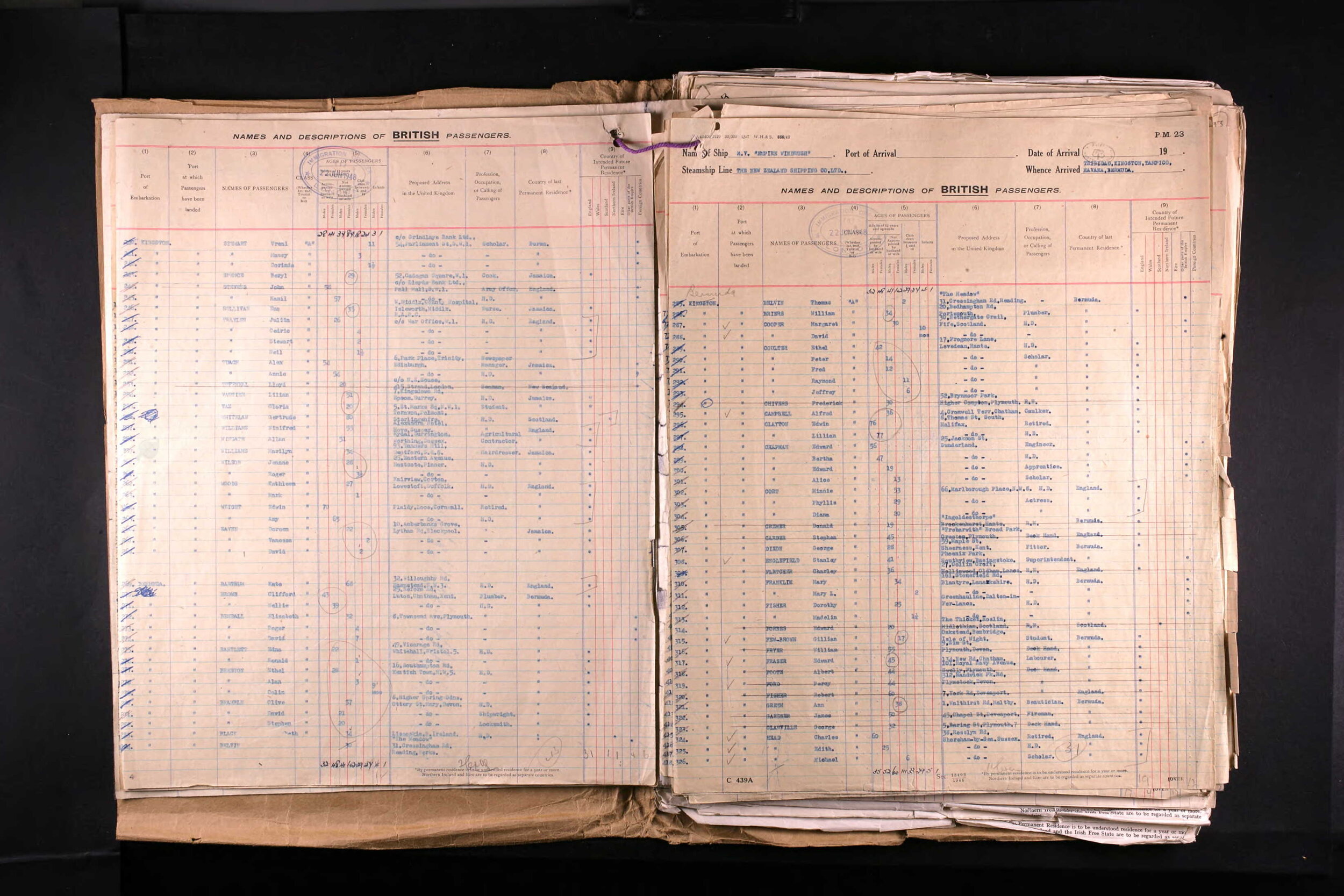
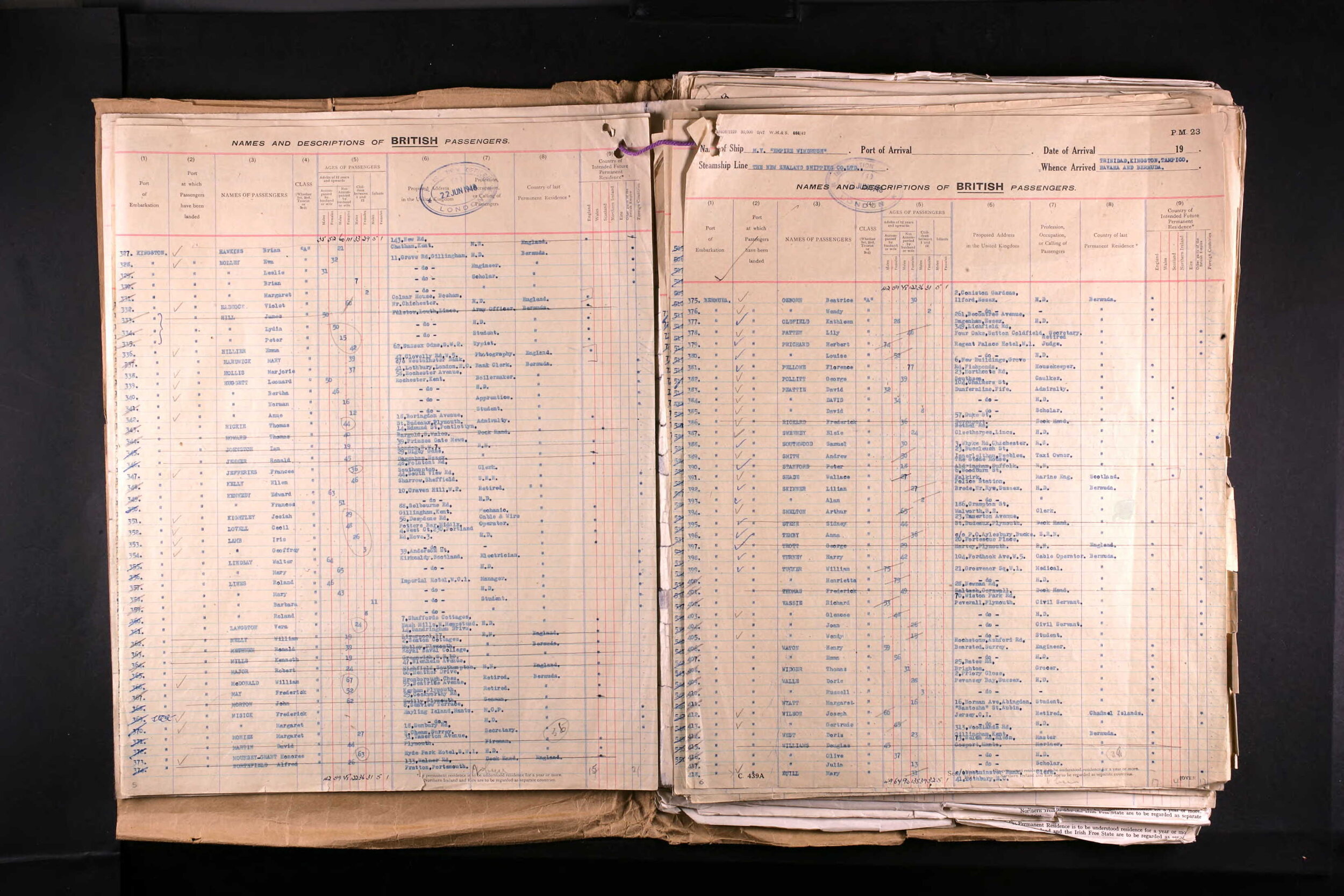
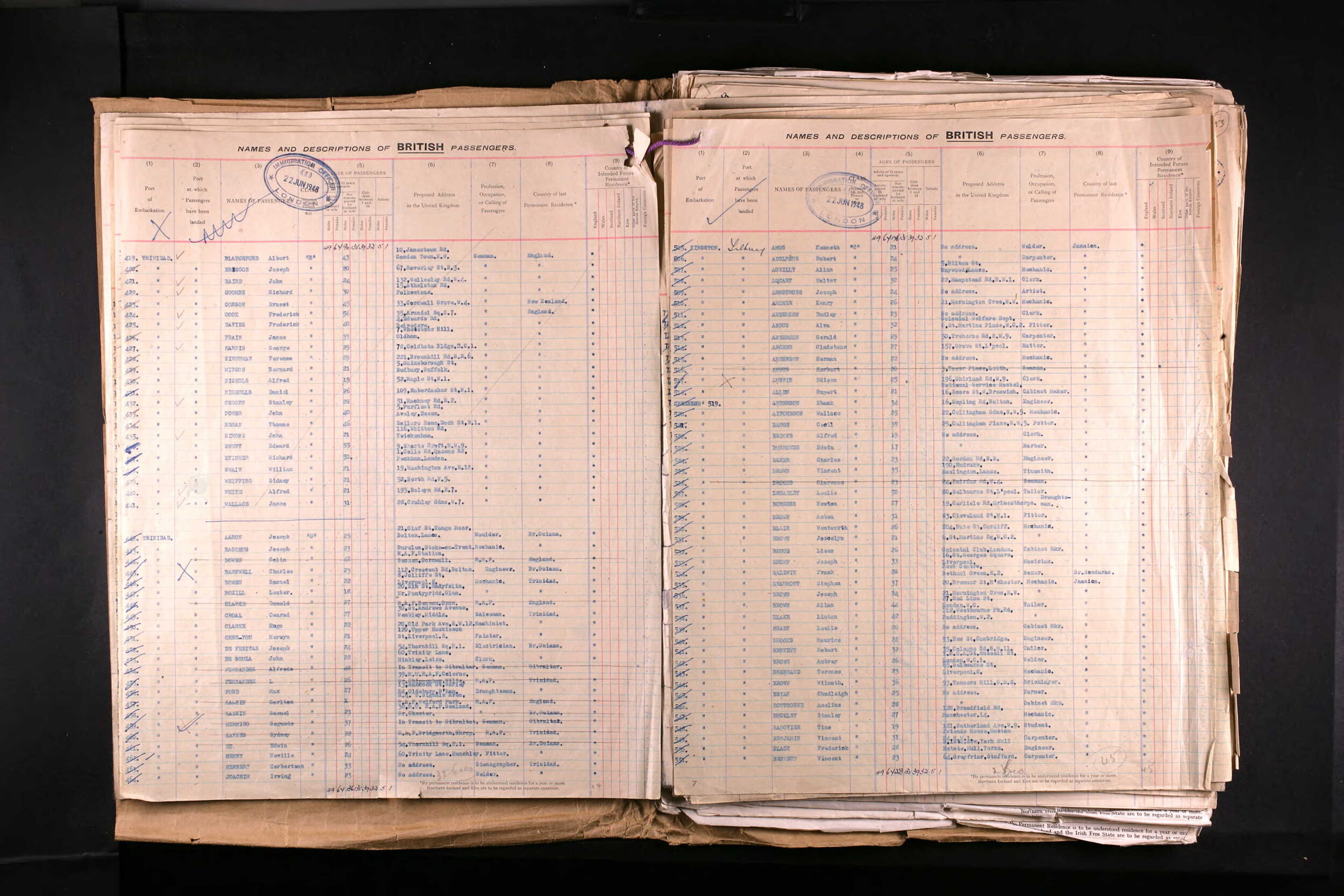

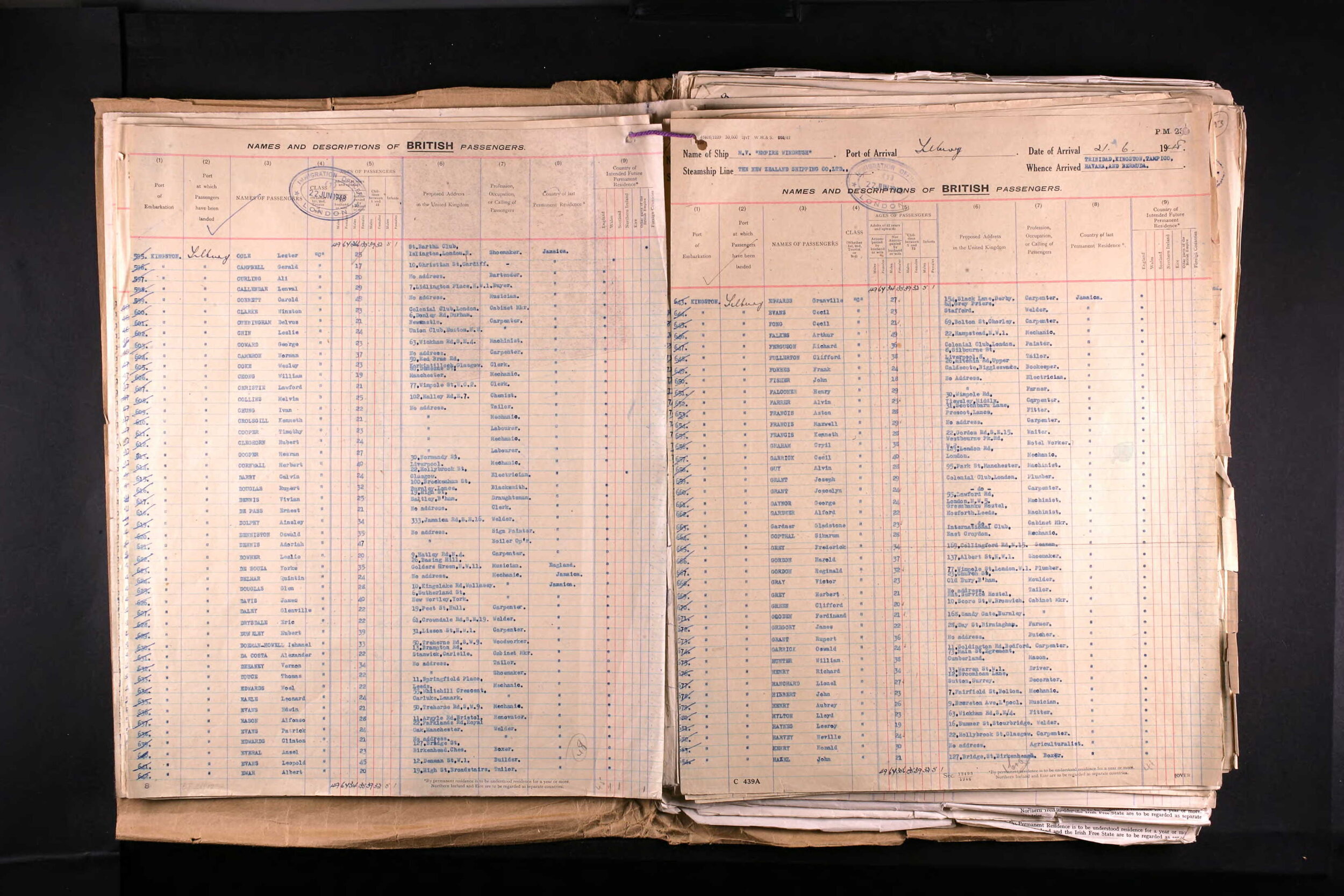
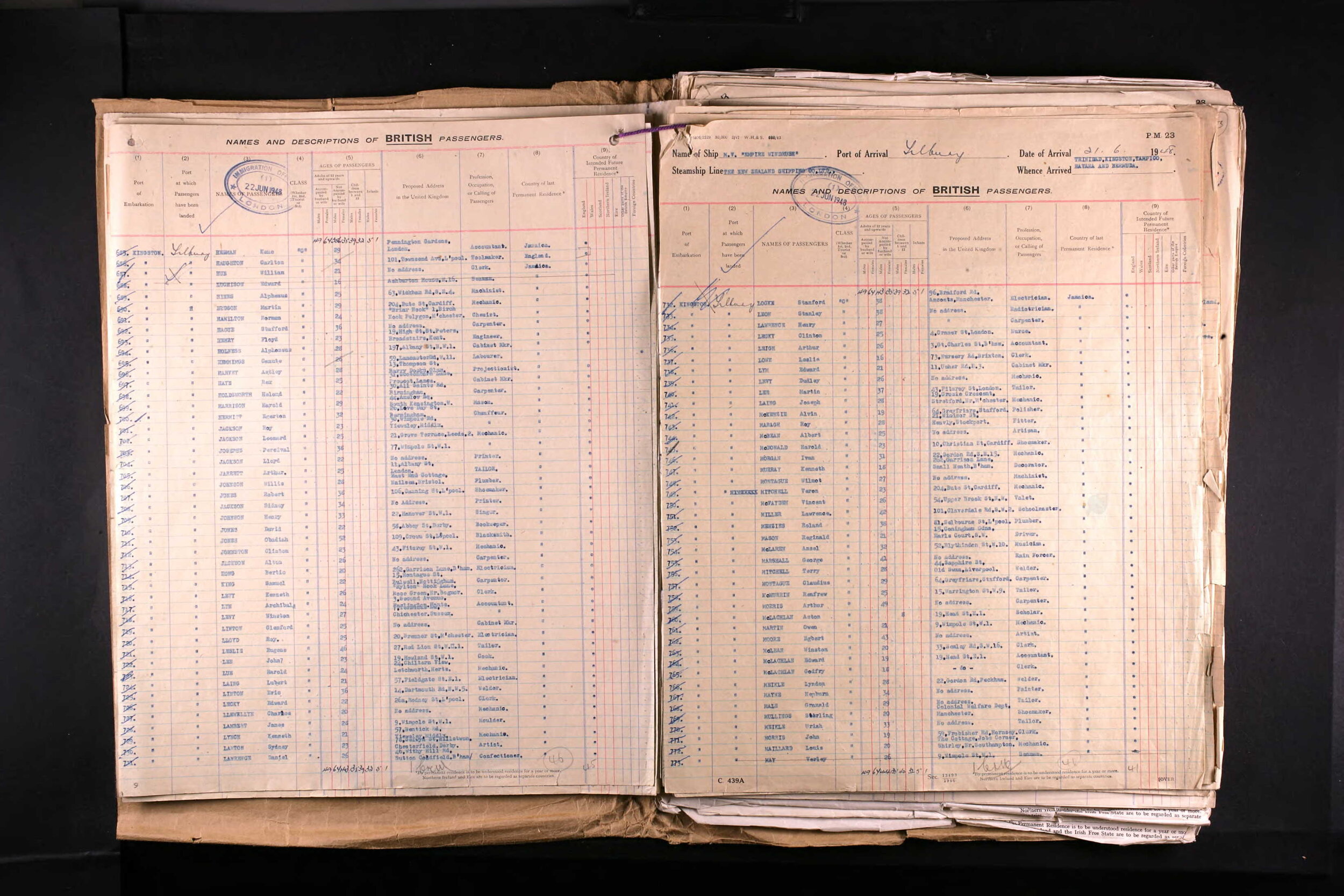
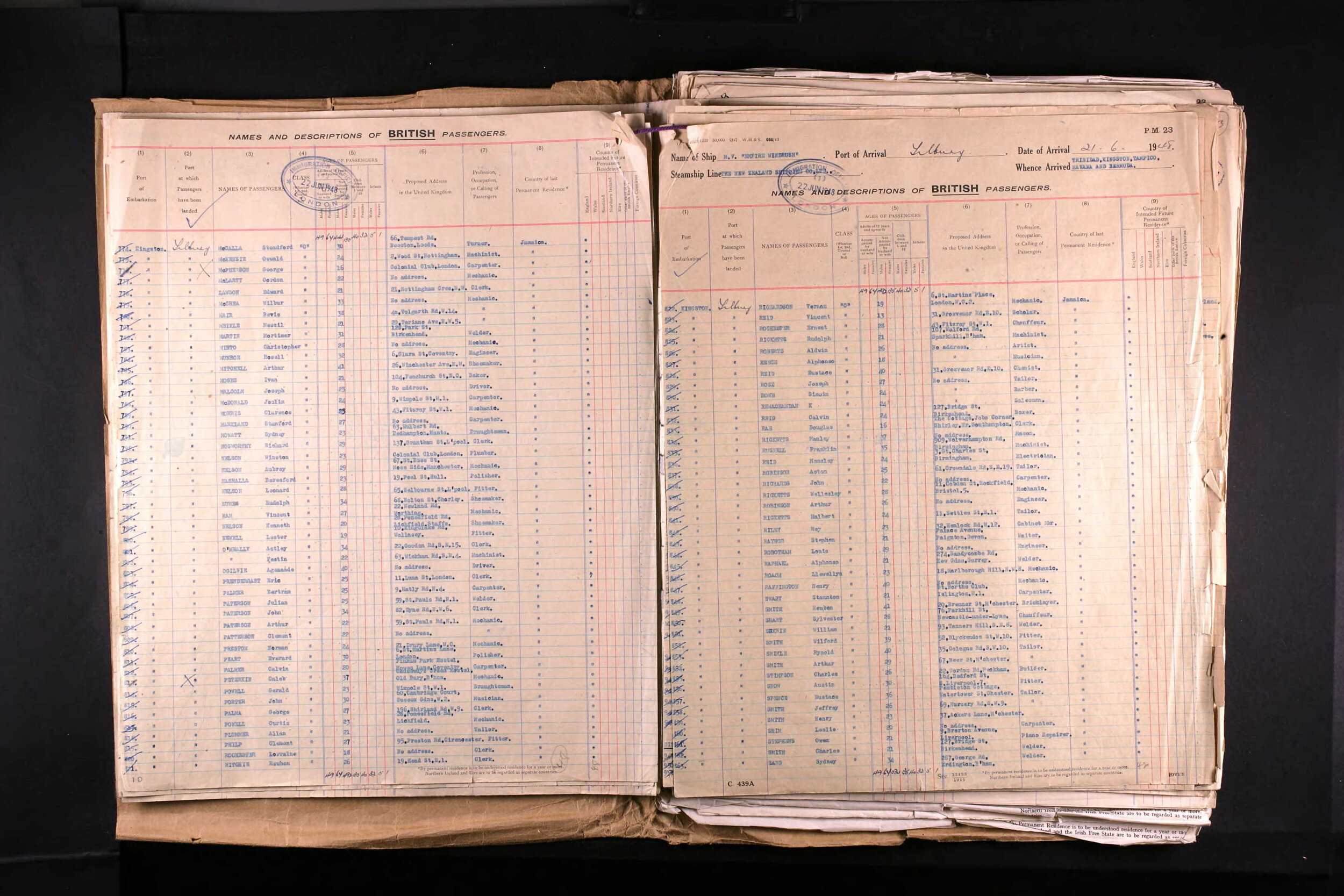
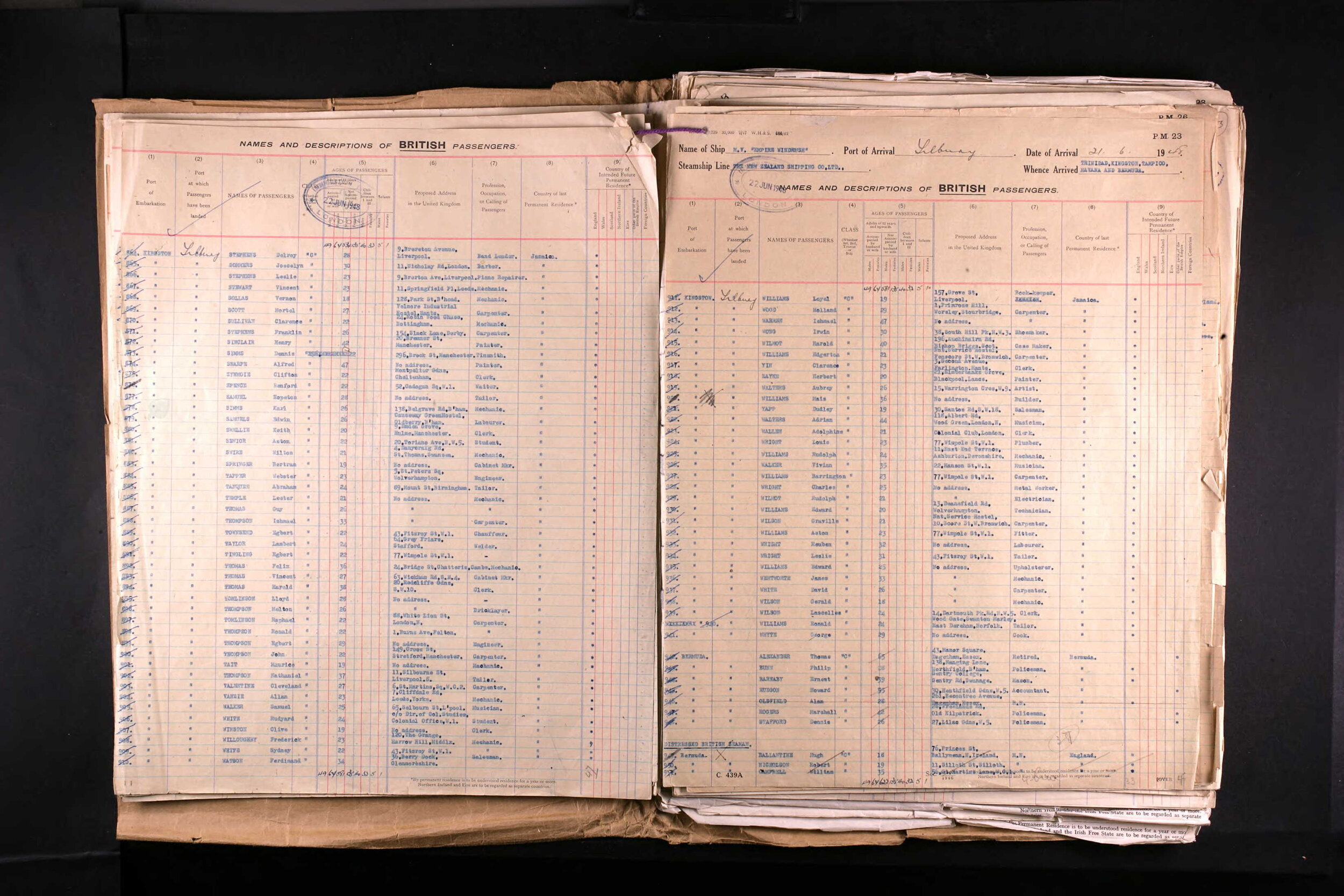

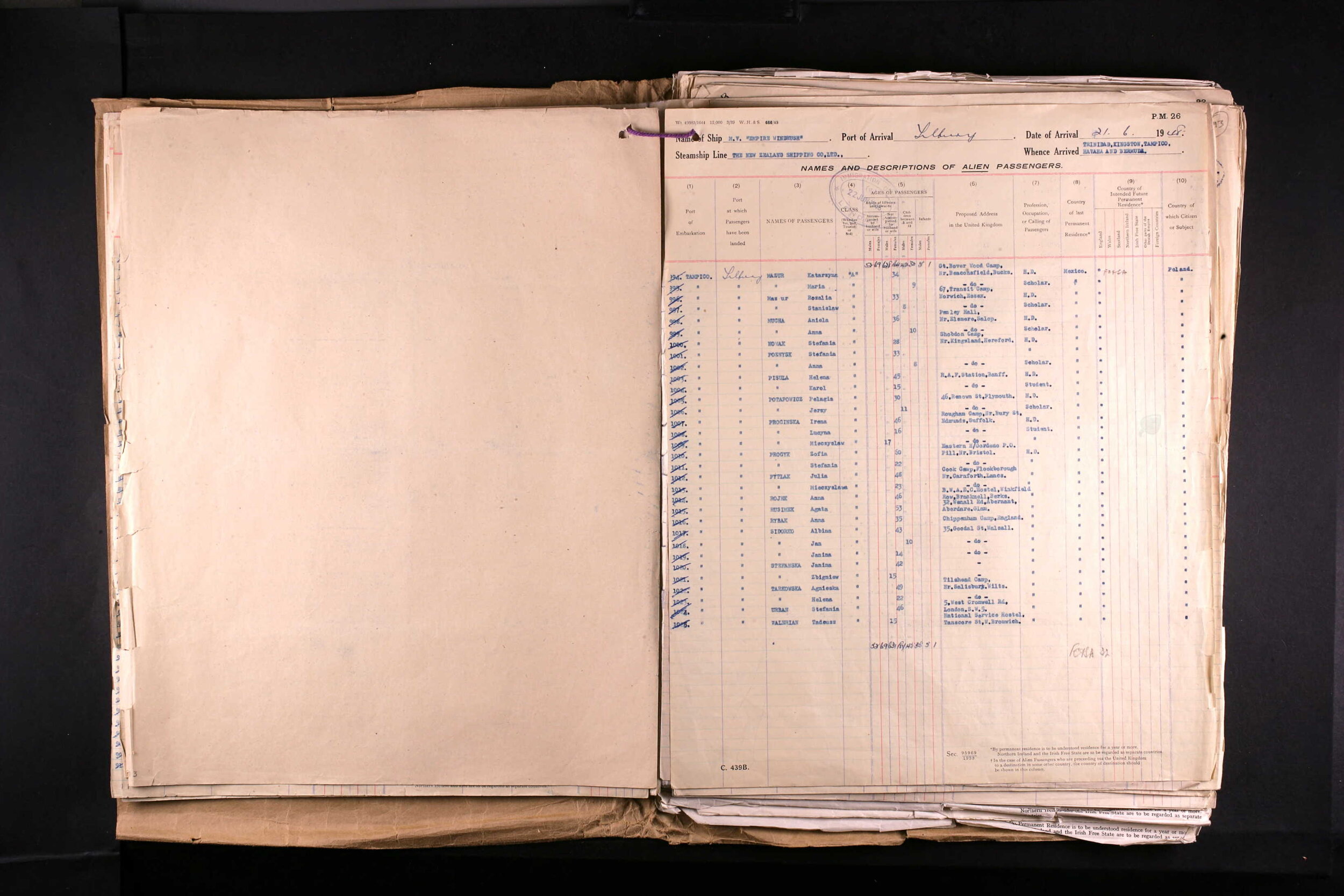
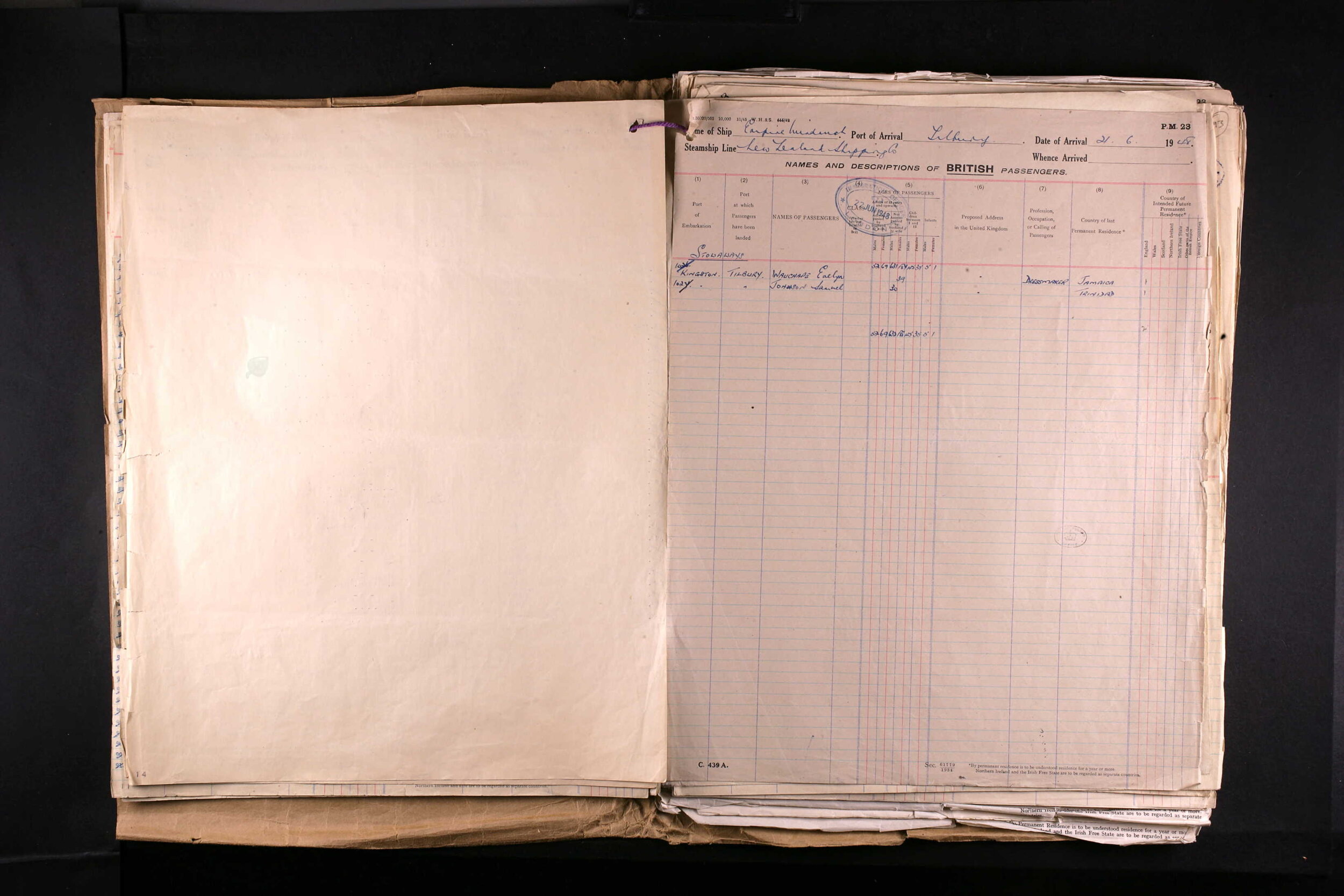
Historical videos
Interviews with persons aboard the M.V. Windrush (at minute 2:48)
"THE JAMAICAN PROBLEM" “Our Jamaican Problem” — Racial backlash experienced
Sir Ellis Clarke Documentary
Music from a client’s project, whose grandfather migrated as a Windrush-era musician.
Excerpt and Image from a Client's Bespoke Memoir created in 2014
The Storyteller, from Antigua, migrated during the Windrush era to train as a nurse in the UK.
When the Second World War ended in 1945, it was quickly recognised that the reconstruction of the British economy required a large influx of immigrant labour. The Royal Commission on Population reported in 1949 that immigrants of 'good stock' would be welcomed 'without reserve'. Consequently, large numbers of workers and their families from outside Europe – mainly from the Caribbean, India and Pakistan – made their way to the United Kingdom in search of a better life. These immigrants were invited to fill labour requirements in London’s hospitals, transportation venues and railway development.
Before 1962, the time when Edrisse first moved to England, there was an 'open door' tradition for Commonwealth Immigrants. In fact the British Nationality Act of 1948 uses the terms 'Commonwealth citizen' and 'British subject' as one and the same thing. However, many immigrants faced various degrees of hostility and racial prejudice with surveys conducted in the mid 1960s, for example, revealing that four out of five British people felt that 'too many immigrants had been let into the country'.
Learn more about this project: Edrisse
Learn more about Windrush by exploring these resources
Read the original British Nationality Act 1948
The Windrush Betrayal, by Amelia Gentleman
The report of the Windrush Lessons Learned Independent Review, by Wendy Williams
Legacies of British Slave Ownership, by the University College London
The Windrush generation: 70 years of Caribbean fashion, by gal-dem.com
Know Your Caribbean Instagram Page
Save your family's stories before they fade
Free Interview Guide
This Interview Guide is part of Plantain's MemoryLines services, developed by our social researchers and life story team to help people record their memories and provide companionship during COVID-19 pandemic.
Phone Interviews
Book a professional phone interview using our simple online system.
A life story expert calls to ask about life/family history over an hour long interview.
Built From Scratch, Just For You
Bespoke packages are crafted from scratch, and you are engaged in every part of the process, which includes expert interviews and sometimes in-depth historical or genealogical research (available as stand-alone services).
🚀 Explore our interactive story map with personal stories and historical data
See personal stories and gain access to tips and historical contexts to help you better understand your place in history.
In honour of World Day for Cultural Diversity for Dialogue and Development, we've created a wonderful map to show how the stories you've shared with Plantain connect us through People, Place and Time.
We'll be continually adding content and the interactive map will eventually work like this:
Click on a location marker
Read or watch a personal story connected to the selected country, and/or,
Access data and fun historical gems that will help you better understand how our life stories are interconnected
We've just started, so stay tuned as we continue to add data to the map! And send us your own memories for us to add using our DIY tips or book a call using MemoryLines!
🚀
Saving Life Stories in the time of Covid.
Introducing MemoryLines: The simples way to record your stories.
Our Co-Founder and her 91-year-old grandmother, who she just helped onboard to using video technology. This is their first video call ♡
Hello Everyone,
Firstly, we hope that you are keeping safe and finding ways to feel connected to your loved ones in these trying times.
At Plantain, we're adapting to the rapid changes while keeping steadfast in our vision to build more connected and empathetic societies through life stories. We are now conducting all our interviews online, and our amazing team is collaborating from as far afield as the US, Europe, the Middle East, and the Caribbean.
Still, the pandemic has forced us to take a little breather, and reflect.
Amongst other things, we've been considering the impact of being indefinitely separated from our elders and family history custodians. In this rapidly changing world, we're being challenged to create new approaches to recording the stories within our communities, and we're very excited to share our newest service with you.
Introducing MemoryLines:
The Simplest Way to Record Your Stories
MemoryLines is geared toward helping folks record their stories, personalities and family histories over a friendly weekly phone call with one of our skilled interviewers.
We have over seven years of experience conducting life story interviews and turning these into heirlooms for families to bond over together. So if you or someone you know has been meaning to start a project like this and is seeking guidance, this calling service may be a perfect match!
Here's how it works:
Sign up.
Our skilled interviewers call your loved ones weekly to ask them questions about their life and family history. Calls will only be recorded with the express permission of interviewees.
These friendly conversations are something they can regularly look forward to, especially important in these times of isolation.
We share the recordings with you so you can pass them on to family, friends and future generations, or even ask us for help crafting an heirloom...
We are happy to offer this service at no cost to all care homes, and at a discounted rate for everyone for the first three weeks.
Start interviewing your loved one with this one question
You often ask us what questions to ask your loved ones if you wanted to interview them yourself. Because our projects are so customised, the questions we ask invariably depend on the context, the person, their background, and a whole host of other factors.
But how about this for a start:
Travel Detectives - “Is that a massive calculator?!…” (See below)
You often ask us what questions to ask your loved ones if you wanted to interview them yourself.
Because our projects are so customised, the questions we ask invariably depend on the context, the person, their background, and a whole host of other factors.
But how about this for a start:
The other day, we watched a documentary on Fred Rogers, who hosted the preschool series Mister Rogers’ Neighborhood between 1968 and 2001. Mr Rogers’ warm persona on the show nurtured an intimate connection to the audience and today he is ranked as one of the greatest TV personalities of all time. Anyway, at one point in the documentary, Rogers is seen giving a speech, where he says:
“From the time you were very little, you’ve had people who have smiled you into smiling, people who have talked you into talking, sung you into singing, loved you into loving.”
And so, as you head into this long, family-filled weekend, how about asking your loved one who that person was to them, and why. The answer just might surprise you!
Contact us if you'd like any more tips... we'd be more than happy to help.
Besides publishing a few books, here's what we've enjoyed since the start of the year
We ran an amazing workshop at New Fire Festival, turning children into time travelling detectives! Our goal was to stimulate interest in the past by encouraging hands-on interactions with old objects. We hope the experience will continue to trigger thoughtful interactions between generations, and encourage the elders' to continue recounting those 'long ago' memories. The event was coordinated by Everything Slight Pepper.
Somebody got us to re-read Othello. It was great! And the introduction to the edition we read struck us, too. Here's what Jonathan Bate had to say: “To stay close to a large segment of the potential audience for public theatre, it was necessary to write for clowns as well as kings [...] Shakespeare realized that theatre could be the medium to make the national past available to a wider audience than the elite who could afford to read large history books”
Notre Dame burning down got us thinking, In the country where you live, what would the equivalent of Notre Dame be? Let us know!
Some articles we've loved:
1956 instructions on how to dance calypso!
How I began to write by Gabriel García Márquez.
How (hi)stories shape our collective identity.
In the ’50s women were pioneering computer programmers – why that changed in the 70s and 80s.
This pamphlet (see below) we found at the Archives, detailing clear (?) instructions on how to dance calypso!
What we endorse:
Tsundoku - the Japanese word for buying books and letting them pile up unread........
What you endorse:
Us! Here’s what you had to say about Plantain:
“Being that I am located in the US, Plantain made my project feel like a priority and I am forever thankful for that.”
- Tina Charles, US Olympic Medalist.“It was awesome working with Plantain on this project”
- Lorraine O'Connor, Management Consultant & Producer.
Thanks for reading. If you like our blog and want to support us, share it with someone who’d like it!
If you’re seeing this blog for the first time, subscribe to our newsletter here.
xoxo,
Plantain.
Gather round, let us tell you our story of 2018.
It’s THE most wonderful time of the year… we hope you’re looking forward to a well deserved few days of rest. But before you do, gather round, and let us tell you our story of 2018!
It’s THE most wonderful time of the year… we hope you’re looking forward to a well deserved few days of rest. But before you do, gather round, and let us tell you our story of 2018!
A year packed with amazing collaborations…
This year we were invited to New York University to give a guest lecture on our storytelling process as students built innovative story maps. They wowed us and we were privileged to later share their work alongside their amazing Professor, Tao Goffe, as panellists at the University of the West Indies’ Caribbean Digital V Conference.
We were juggling a very different (but welcome) scenario at more or less the same time, as we were one of only 10 startups selected to attend the TechBeach Retreat in Jamaica. Here we had fun and thought-provoking conversations with some of the best minds in the tech world.
A search for who we really are…
At Plantain, we believe that recording, sharing and celebrating our personal histories helps create a more connected world. Key to our view is that by reflecting on the legacies we’ve inherited (the good / the bad), we develop a more grounded and dignified sense of self. We were happy that our perspectives (more about them here) were shared in the media, such as in this Atlas Obscura article, and on this blog.
Salvaging stories…
We also volunteered to help families struck by a terrible flood in the region late this year. While out in the field, we found two young women trying desperately to salvage photos of their father, who had passed away not long before. Because we work so much with photographs here, we decided to create this tip sheet to help preserve what is oftentimes the only thing left connecting us (and future generations) to our loved ones. 🧡
And then the Books…
Of course, we continued crafting a wonderful range of bespoke books, some leaning heavily on research, others on existing oral histories.
Through them, we travelled to N. America, over to Scotland, England, the Great War’s frontlines between France and Germany, down to Italy, Corsica, Portugal, over to Venezuela, Trinidad, St. Lucia and St. Vincent. Phew!
The books include one of the most dynamic ever, the most poetic, the most glamorous and debonair, and one of the prettiest ones too. We’ll soon have photos for you.
The quote we loved most this year…
“I can feel in my bones what a century is like…”
This said Oliver Sacks, the celebrated professor of neurology on turning 80. He goes on to say that his father told him his 80s had been his life's most enjoyable decade. But in our post on ageing, we spoke of how that feeling is in stark contrast to younger generations’ eventual regret at not having recorded their elders’ life stories before they passed on.
Other than... us… What else grabbed our attention in 2018?
How about this study, on how, when you see something, a great part of what you perceive is determined by your memory and past experiences(!).
This poignant article, which beautifully highlights the emotional distance between migrants and their children.
Then there was Michelle Obama describing, in her memoir, the struggle she felt reconciling her very personal ambitions, and those of her family’s, "I hoped to be exactly like my own mother and at the same time nothing like her at all. Could I have everything?"
Windrush dominated the news, but did you know that at Plantain, we also had the pleasure of working on one story from the same period – a woman courageously making her way to the UK from Montserrat?
Related to Windrush, THOSE house parties greatly popularised Reggae and its eventual recognition by the UN as a global cultural treasure.
The media also highlighted the push to return Africa’s loots, with one coordinator asking of his audience, “What do you think will happen to any African country if we could sneak in [to Buckingham Palace], pick that crown, and come back home with it?”
On a less serious topic, do you know the literal translation of your country's name? What does where you're from mean?!
And finally, the concept of Jolabokaflod – the Icelandic tradition of Christmas eve reading.
On that note... as you sit with your loved ones this season, why don't you record some of your (or their) stories? If you need guidance or want to gift them a book (big, or small), then just let us know!
🌸
It takes a great community to make the work that we do possible. As the year comes to an end, we are left feeling grateful and so a great thanks to you for your continued support...
From all of us here, we hope that you have a season filled with family, love and laughter, and we look forward to catching up with you in the new year!
Your team at Plantain.
We’ve been around… Anyone spot our sticker in NY?!
How family history shapes our identity.
Today, our definition of “identity” derives itself mostly from Erik Erikson’s concept of an “identity crisis.” He defined “identity crisis” as “the condition of being uncertain of one’s feelings about oneself, especially with regard to character, goals, and origins…”
Today, our definition of “identity” derives itself mostly from Erik Erikson’s concept of an “identity crisis.” He defined “identity crisis” as “the condition of being uncertain of one’s feelings about oneself, especially with regard to character, goals, and origins…”
But then, what forms our character, goals and origins?
Over the course of our lives, we will internalize, both consciously and subconsciously, values or constructs simply because we are told to and because they seem natural. But if our identities are socially constructed, then they cannot be neutral. Indeed, society ultimately posits the superiority of one identity over another: men over women; whites over non-whites; straight over gay; wealthy over other classes; one religion over another… In fact all of these constructs – gender, race and ethnicity, sexual orientation, class, etc. – determine, to a large extent, the roles that we ‘should’ be acting out, including whether we assume power within society or fall victim to systematic prejudices and unequal opportunities.
Understanding and studying our heritage — the good as well as the bad — is crucial to giving yourself a choice on how to interpret your own construct of self and your role in society.
Asking our loved ones, parents and grandparents to recount these stories can be difficult (“This is big people business!”), especially considering the trials they might have lived through. But it is necessary to look back in order to chart a better future, especially for the generations to come. Exploring our past means we can gain a more grounded sense of identity. One that can be less swayed by the media or the populist politicians or the radical theologians. This means a less troubled mind, a less troubled world. A more empathetic world.
Every day we lose thousands of oral histories and records. Time is precious and we cannot afford to wait until it’s too late. We all have a story to tell.
What exactly should we be celebrating?
Today, October 1st, we mark the International Day of Older People. The UN created this annual event in 1991 to celebrate people in later years of their life.
So what exactly should we be celebrating?
Today, October 1st, we mark the International Day of Older People. The UN created this annual event in 1991 to celebrate people in later years of their life.
So what exactly should we be celebrating?
Oliver Sacks, the celebrated professor of neurology and author at NYU wrote, to our minds, one of the most elegant pieces about ageing when he turned 80 years old:
My father, who lived to 94, often said that the 80s had been one of the most enjoyable decades of his life. He felt, as I begin to feel, not a shrinking but an enlargement of mental life and perspective. One has had a long experience of life, not only one's own life, but others', too. One has seen triumphs and tragedies, booms and busts, revolutions and wars, great achievements and deep ambiguities, too. One is more conscious of transience and, perhaps, of beauty.
But the serenity that comes with living out and owning history — “I can feel in my bones what a century is like,” Sacks goes on to say — is in stark contrast to the younger generation’s regret at not having recorded their elders’ life stories before they passed on, and the ensuing loss of 'connections'.
If you missed it, our well-received TED talk explains what exactly it is we mean by ‘connections’ and why we believe they are vital to creating a better society.
And so, for us, the International Day of Older People is about recording those life stories, while they are still here with us.
A beautiful day to you all, and do let us know if you would like us to assist you recording your life story, or that of your loved one, or if you simply need advice on how to go about it... We would be happy to help.
We leave you with this short, heartwarming film we created last year, celebrating the life and passions of one of our elder clients, Gloria.
With warm wishes always,
Your team at Plantain.
2017 has been quite a year, and we're thrilled to give you an update on what’s been happening on our end...
We were really excited to relaunch our site back in October, complete with new client testimonials and a fresh new look.
Our New Website (amazing!)
We were really excited to relaunch our site back in October, complete with new client testimonials and a fresh new look. Hop over to www.plantain.me in case you missed it.
This was a great reflective exercise and one of the key questions we asked ourselves was: How can we help our clients have more meaningful conversations with their loved ones? It also gave us the opportunity to launch a new service we’re particularly pleased with - Plantain Clips… 👇
Plantain Clips: Our smallest bespoke package
Everyone has stories to tell - whether of growing up "pelting down” mangoes or of reconnecting with long-lost loved ones - and we were sometimes approached by families wanting to commemorate these through smaller packages than our books.
We thought, If they could send us audio recordings of their family stories (a lot of them recounted endless times at the dinner table anyway) alongside relevant images, couldn't we transform these into beautiful, individualised films?
And that’s exactly what’s been happening! Head over to our Plantain Clips page and you'll find a stories that families from all over the world have have sent us to work on...
Our Memory Bank continues to grow, so do check in regularly for our weekly releases...
Life and Loss
Plantain Clips are especially well suited for helping groups, communities, schools, and organisations honour and capture the stories that define them.
This year, we stepped back into the realm of Global Health (to the glee of our co-founders!) and were privileged to help persons suffering from various stages of dementia capture their memories before they faded even further.
We have special rates for these groups so do reach out to us if you know of any that might benefit from this service!
Firefly Memories: A Collaborative Reminiscing App
We ended the year by presenting a prototype of our app, Firefly Memories, that was built with an Innovation Grant we were awarded from the Government.
Reminiscing is a tremendously powerful way to (re)connect with others, and Firefly Memories is designed to evoke those feelings by allowing you to co-create memories with friends and family.
We’d love for you to be a part of this journey, so do let us know if you would like to get involved!
Books and more Books!
Otherwise, we continue to work on what Plantain was originally built on - beloved Books! In 2017 the memoirs, family history books, and corporate projects continued to grow in range, depth and numbers.
Our clients continued to inspire us with stories of loss, resilience, and triumph, and we explored intersecting lives across Corsica, France, Venezuela, Trinidad and Tobago, Jamaica, the UK, the US, China, Lebanon, New York, Scotland, Canada...
TEDx
Finally, we were truly honoured this year to be invited to speak in the company of other world-class thinkers and doers.
For those of you who were not there (we’ll make sure to share with you the video when it is released), our talk centred on how we believe a better understanding of your (hi)story gives you a more grounded sense of self and unveils just how intimately connected we humans all are.
This, we believe, will ultimately contribute to a more genuine and empathetic world…
It is with this spirit that we thank you for being part of our (hi)story and would like to extend to you wishes for a new year filled with peace, compassion, laughter and sound health.
See you all next year!
🌸
Your team at Plantain.








